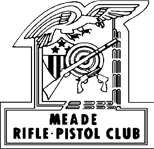Checking Out Ranges at the Fort Meade Range Complex
Given that our membership has expanded greatly over the past few years, and there was a change in leadership at Meade Range Control (MRC), what follows is a clarification of MRPC policy regarding the scheduling, and usage of ranges, and the role of the Range Safety Officer for those ranges utilized by MRPC. This policy applies only to MRPC members operating under the auspices of the Meade Rifle and Pistol Club (MRPC).
Range Schedule
The schedule request for the next year goes to MRC in October, and we always request more range use than we are finally approved for.
At the beginning of each calendar year the schedule and range assignments by MRC are firmly fixed. However, throughout the year changes regarding whether a range can be used and by whom does change for a wide variety of reasons. The following are some examples:
- Range cancellations occur most frequently due to official range users (e.g., military and police) requiring a range for official use taking precedence over their use by Historical Range Users (e.g., MRPC, Meade Rod and Gun Club (MR&GC).
- Range cancellations also occur when work needs to be done in the impact area, such as an animal census by Wildlife Refuge staff.
- Less frequently, throughout the year MRC will make adjustments regarding which Historical Range User will use a particular range, mostly due to opportunities to conduct a special event.
- Finally, MRPC will request and obtain approval for the use of a range in excess of its immediate requirements. These are identifies on the schedule by the letters “MRPC” rather than a recognized club activity such as Club Rifle, or Weaponcraft. Club members requiring a range should look for these opportunities prior to asking to use a range not already assigned to MRPC for use.
Range Safety Officers (RSO)
Only MRPC members with a valid (i.e., not out of date or cancelled) Range Safety Briefing Verification Card (DPTMS Form 63) issued by MRC can sign out a range assigned to MRPC and act as its RSO. The two-man rule applies at all times and without exception. The range must be occupied by no less than two people at all times, one of whom is the recognized RSO who signed out the range. No exceptions to this policy will be entertained.
To obtain a DPTMS Form 63, MRPC members must attend the RSO qualification course put on by MRC each month before a DPTMS Form 63 is issued.
To attend the RSO qualification course MRC will only accept persons who hold an NRA Instructor Certification, or verifiable experience as a weapons instructor in the US military, or in a recognized State, Local or Federal Law Enforcement (LE) agency.
While helpful and welcome, a National Rifle Association (NRA) RSO certification is not sufficient, and is not a substitute for the instructor requirement mentioned above.
In addition to those qualifications stated above, applicants attending the MRC RSO qualification course for the express purpose of becoming an MRPC RSO will be vetted by MRPC’s Chief RSO. This vetting process will be comprised of two components:
- A careful review of the documentation verifying the individual’s status as a recognized weapons instructor, either through the NRA or through their experience as a weapons instructor with the US military, or a State, Local or Federal LE agency.
- A verbal exchange between the individual and the MRPC Chief RSO to validate the individual has the temperament and the experience required to adequately perform their duties as an MRPC RSO.
Under normal circumstances, the RSO assigned to each MRPC range is directly responsible for the conduct of all activities on that range. With regards to these activities, the RSO will have the final word.
However, in some case the issue will be elevated to the MRPC Chief RSO for a decision. The Chief RSO has the option of either making a final decision or elevating it to MRC for a final decision.
All decisions by MRC are final and not subject to further discussion.
